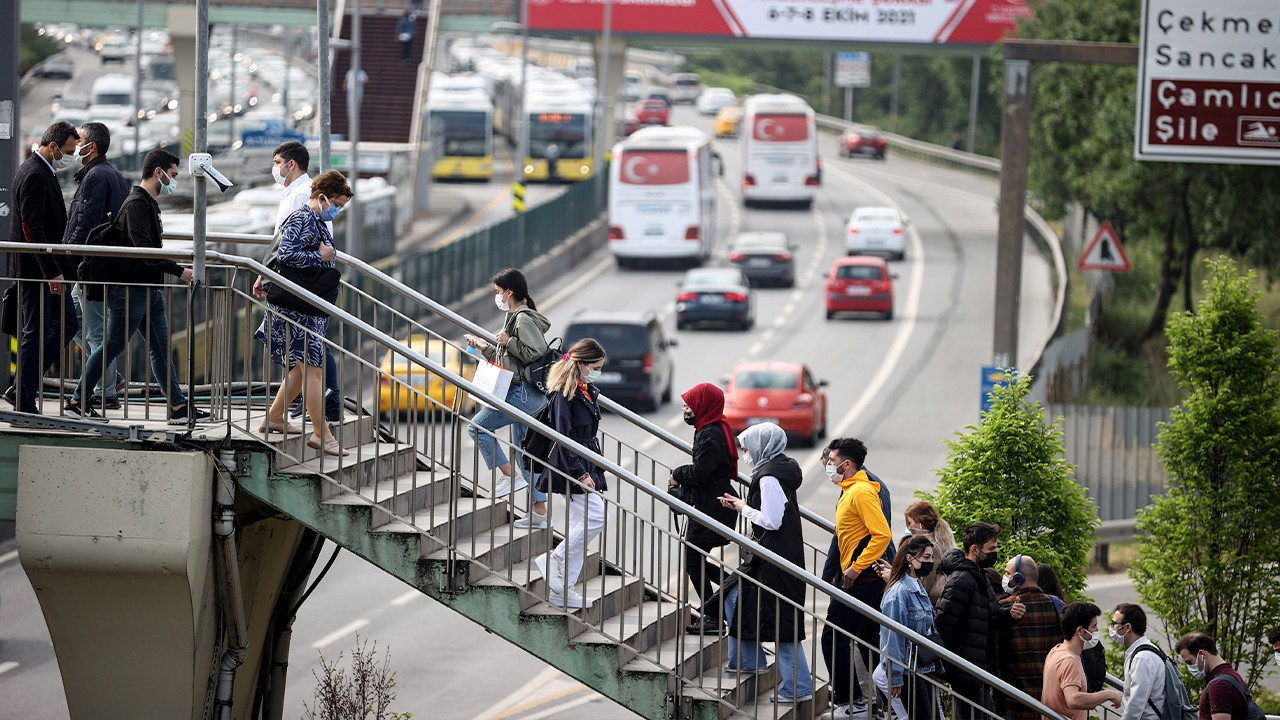Unemployment in Turkey worse than gov’t claims, especially for women and youth
The Confederation of Revolutionary Trade Unions of Turkey Research Center's (DİSK-AR) "Unemployment and Employment Outlook April 2021 Report" pointed out that unemployment in Turkey is worse than it was at the early stages of the pandemic, as only 16 out of every 100 women are full-time employed, and nearly 10 million people are jobless.
K. Murat Yıldız / Duvar English
On June 10, 2021, the Turkish Statistical Institute (TÜİK) released the results of their April Household Labor Force Survey (HIA). Following the publication of TÜİK’s statistics, the Confederation of Revolutionary Trade Unions of Turkey (DİSK) published its own report, the "Unemployment and Employment Outlook April 2021 Report," based on TÜİK’s data and its own findings.
According to the DİSK report:
- Unemployment continues to rise as a result of the Covid-19 pandemic.
- During the pandemic, female unemployment has increased even more.
- The broad-defined female unemployment rate has reached 34 percent.
- The difference in unemployment rates with broad and narrow definitions is 13.5 percentage points.
- While the official employment rate is 43.3 percent, the registered and full-time employment rate is only 29.7 percent.
Furthermore, while the seasonally adjusted number of ‘narrowly unemployed’ people was 4.5 million in April, according to TUİK's data, the broad definition of unemployed was 9.83 million, according to DİSK's calculations.
“When looking at unemployment rates by gender, it is clear that female unemployment is higher than male unemployment in every category. Men have a seasonally adjusted unemployment rate of 12.9 percent, while women have a seasonally adjusted unemployment rate of 15.9 percent. Moreover, the broadly defined unemployment rate at 24.4 percent for men and 33.3 percent for women,” the report noted.
While narrow-defined unemployment is 3 points higher for females than males, broad-defined unemployment is 8.9 points higher for females than males. In addition, female unemployment is much higher than male unemployment in all categories.
“The tendency to leave the labor market is increasing as a result of the economic crisis that began in Turkey in September 2018 and the pandemic that has been ongoing since March 2020,” DİSK’s report states.
In April 2019, for example, narrow-defined unemployment was 13.8 percent, while broad-defined unemployment was 19.1 percent. However, in April 2021, narrow-defined unemployment was 13.9 percent, while broad-defined unemployment was 27.4 percent. Thus, the difference between narrow and broad-defined unemployment has widened to 13.5 percentage points.
A quarter of workforce unemployed according to TÜİK
Even with TÜİK’s unemployment and labor statistics the picture is grim according to experts, such as associate professor of economics Baki Demirel.
“The unemployment rate, which includes time-related underemployment, the potential workforce, and the unemployed, increased by 1.7 percentage points to 27.4 percent in April compared to the previous month. As a result, we must confront the fact that one out of every four people in Turkey’s workforce is unemployed,” Demirel told Duvar English.
He concluded by highlighting the specific problems regarding youth unemployment, saying, “We must address the high rate of youth unemployment which in April was 25.6 percent, and the employment rate was 32 percent, according to TÜİK. The youth labor force participation rate was reported to be 43 percent. To put it another way, only three out of every ten young people have a job. This really upsets me as an academic.”
Pandemic effect
“The most important reason for the widening of the gap between narrow and wide unemployment is that during the pandemic, the lay-off ban kept narrow-defined unemployment at a low level and reduced working time. As a result, while narrow-defined unemployment remained low, broad-defined unemployment skyrocketed,” the DİSK report pointed out.
For the first time, DİSK also released its own data on registered full-time employment. While TÜİK's official employment rate was 43.3 percent in the first quarter of 2021, DİSK’s research center calculated a Registered Full-Time Employment Rate (KATİ) of 29.7 percent based on TUİK data. Moreover, while the official female employment rate was 26.3 percent, the DİSK rate was calculated to be 16 percent, as the official male employment rate was 60.5 percent, DİSK calculated it at 43.6 percent.
DİSK's study has also revealed that only 18.8 million of the 63.5 million people of working age are in formal or full-time employment. Of the 32 million women of working age, only 5.1 million are in formally registered full-time employment.
TÜİK’s methodology and data questioned
DİSK also criticized TÜİK’s labor statistics and the methodology it used to calculate employment and unemployment, noting that “TUİK's monthly data are insufficient to assess the impact of Covid-19, which has resulted in significant job and income losses throughout the world, on the labor market in detail and on a monthly basis.”
“Those who are employed but not working are excluded from TÜİK’s monthly data. Therefore, it does not include the number of people who appear to be employed but are not working during the pandemic. Also, the number of people who are not looking for work but are willing to work, the number of unemployed people who have given up hope and quit looking for a job, and details on youth unemployment are all missing from TÜİK’s monthly data,” the report pointed out.
“The number of unemployed people in Turkey is more than the population of dozens of countries in the world. People are struggling to put food on the table. Manipulating statistics won’t change this reality,” Kani Beko, former head of DİSK and a deputy of the main opposition Republican People's Party (CHP), told Duvar English.
Unemployment funds not used for people
“Billions of liras from the government’s unemployment fund have been channeled into infrastructure projects and pro-government companies via state banks. Like TÜİK, the pro-government media doesn’t report suicides committed due to financial problems which have become daily news.” Beko went on to say, "This is government-organized graft."
He concluded by highlighting just how bad the situation is, saying, “Unfortunately, due to the fear of Erdoğan, institutions have been hiding the realities from the people and world. What TÜİK is doing is ridiculous. To manipulate labor statistics, they are including internships in their calculations. They should be aware that they are causing more harm than good to this country.”

 Turkish gov’t using pandemic to silence artistic defiance, say musiciansCulture
Turkish gov’t using pandemic to silence artistic defiance, say musiciansCulture Turkish unemployment rose to 13.9% in AprilEconomy
Turkish unemployment rose to 13.9% in AprilEconomy Educated jobless replaced uneducated jobless in TurkeyOpinion
Educated jobless replaced uneducated jobless in TurkeyOpinion 70 pct of Turkish youth unemployed, depend on their familiesEconomy
70 pct of Turkish youth unemployed, depend on their familiesEconomy